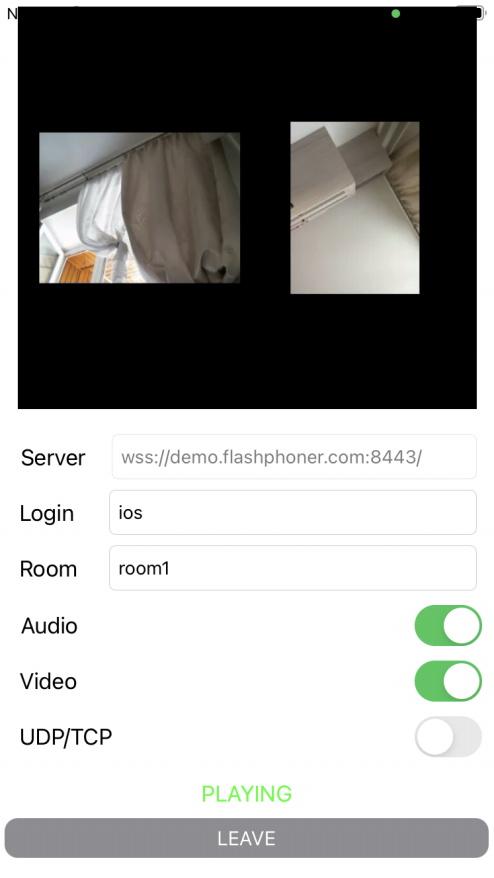Example of client for MCU conference participant
This example can be used to organize an MCU video conference on Web Call Server. Each participant of such conference can publish a WebRTC stream and play a mixer stream with audio and video from the other participants and own video (without own audio).
The following settings are required in WCS flashphoner.properties
mixer_auto_start=true mixer_mcu_audio=true mixer_mcu_video=true
When a participant joins a conference using the client
- a stream with video of the participant, named <participantName> + "#" + <roomName>, is published
- the participant's stream is added to mixer named <roomName> (in case such mixer did not exist, it is auto created)
- a new mixer named <roomName> + "-" + <participantName> + <roomName> and containing video from all the participants (including this one) and audio only from the other participants is created and played for the participant
On the screenshot below the participant is publishing a stream and playing his conference mixer stream:
Analyzing example code
To analyze the code take MCUClientSwift class which is available on GitHub.
Man application view class: MCUViewController (implementation file MCUViewController.swift).
1. API import code
import FPWCSApi2Swift
2. Session creation and connecting to the server
WCSSession, WCSSession.connect code
The following session parameters are set:
- WCS server URL
- server application name defaultApp
@IBAction func joinPressed(_ sender: Any) {
self.changeViewState(joinButton, false)
if (joinButton.title(for: .normal) == "JOIN") {
if (session == nil) {
let options = FPWCSApi2SessionOptions()
options.urlServer = serverField.text
options.appKey = "defaultApp"
do {
try session = WCSSession(options)
} catch {
print(error)
}
}
...
self.changeViewState(serverField, false)
session?.connect()
} else {
leave()
}
}
3. Participant stream publishing
WCSSession.createStream, WCSStream.publish code
The following parameters are passed to createStream method:
- stream name to publish
- local view to display
- WebRTC transport type
- audio and video publishing constraints
func publish() {
...
let constraints = FPWCSApi2MediaConstraints()
if (audioSwitch.isOn) {
constraints.audio = FPWCSApi2AudioConstraints()
}
if (videoSwitch.isOn) {
constraints.video = FPWCSApi2VideoConstraints()
}
let options = FPWCSApi2StreamOptions()
options.name = loginField.text! + "#" + roomField.text!
options.transport = transportSwitch.isOn ? kFPWCSTransport.fpwcsTransportTCP : kFPWCSTransport.fpwcsTransportUDP
options.constraints = constraints
options.display = localDisplay.videoView
do {
publishStream = try session!.createStream(options)
} catch {
print(error);
}
...
do {
try publishStream?.publish()
} catch {
print(error);
}
}
4. MCU mixer stream playback
WCSSession.createStream, WCSStream.play code
The following parameters are passed to createStream method:
- stream name to play
- remote view to display
- WebRTC transport type
func play() {
...
let options = FPWCSApi2StreamOptions()
options.name = roomField.text! + "-" + loginField.text! + roomField.text!
options.transport = transportSwitch.isOn ? kFPWCSTransport.fpwcsTransportTCP : kFPWCSTransport.fpwcsTransportUDP
options.display = remoteDisplay.videoView;
do {
playStream = try session!.createStream(options)
} catch {
print(error)
}
...
do {
try playStream?.play()
} catch {
print(error);
}
}
5. Stream playback stopping
WCSStream.stop code
func stopPlay() {
do {
try playStream?.stop();
} catch {
print(error);
}
playStream = nil;
}
6. Stream publishing stopping
WCSStream.stop code
func stopPublish() {
do {
try publishStream?.stop()
} catch {
print(error);
}
publishStream = nil;
}
7. Connection closing
WCSSession.disconnect code
func leave() {
session?.disconnect()
session = nil;
}
